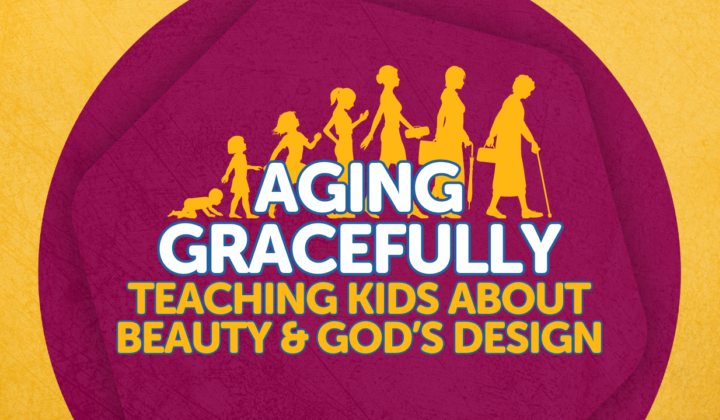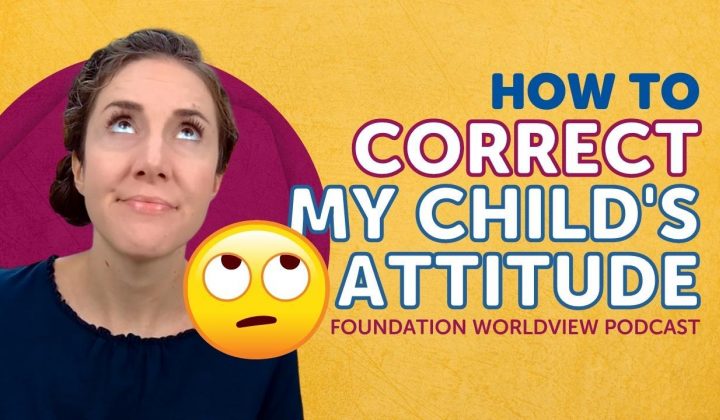Learn more about the journey that led to us equipping kids to carefully evaluate every idea they encounter.
Meet members of our team who have contributed to curriculum development.
Hear from real users of the Foundation Curriculum.
Learn what we believe about God, Jesus, Scripture, and more.
How to Talk About Beauty with Your Daughters (and Sons)
Hello, friends! Today's podcast question says:
"I am raising four daughters, and they're creeping close to the teenage years. How should we talk about beauty with them? And how can we decide when and if it’s right for them to wear makeup or make other choices about their appearance—such as dying their hair, getting their ears pierced, etc.?"
This is such an important question for us to think through—whether we’re raising girls or boys—but especially if we’re parenting daughters. As they approach the teenage years, they’re going to care more about their appearance. So, how do we talk with them about beauty? And how do we help them make wise decisions?
That’s what we’re going to dive deep into today on the Foundation Worldview Podcast, where we seek to answer your questions so you can equip the children God has placed in your care to carefully evaluate every idea they encounter and understand the truth of the biblical worldview.
I'm your host, Elizabeth Urbanowicz, and I'm thrilled that you've joined me for another episode.
Now, as I was preparing for this podcast, I actually pulled out a Hebrew lexicon to look at the different words that are translated as "beauty" in our English Bibles. Now, I’m not a Hebrew scholar—I don’t know how to speak Hebrew properly—but I noticed something interesting as I looked at the different Hebrew words behind our English word “beauty.”
There are three specific Hebrew terms that show up, and they really break down into two distinct categories.
The first word is yefeh (though again, I’m sure I’m not pronouncing it correctly). This word is consistently used in the Old Testament to describe things that are aesthetically pleasing—things that look beautiful.
Then, there are two other Hebrew words—noam and tiferet—that are used to describe things that are morally right and good. So, the Bible presents two different types of beauty:
-
Aesthetic beauty — things that are pleasant to look at
-
Moral beauty — things that are good and righteous
Both of these types of beauty ultimately reflect who God is. God is more aesthetically beautiful than we could ever imagine. No man has seen God, but one day we will stand in His presence, and He will be more beautiful than we can fathom. Everything we see around us that is aesthetically pleasing is either something God created or something created by those made in His image.
And God is also morally perfect—the only truly perfect being. So, both aesthetic beauty and moral beauty point us back to Him.
When we talk with our children about beauty, we want to make sure we’re starting with this foundation: beauty can refer to two different things. When we say something is “beautiful,” we usually mean one of two things:
-
It's aesthetically pleasing (it looks nice), or
-
It's morally right and good (it reflects righteousness)
To help our kids understand these two categories, a great first conversation is to make two lists with them:
First, list things that are aesthetically beautiful—things that are pleasant to look at. That might include:
-
A joyful smile
-
A sunset
-
A mountain range
-
A bright red cardinal
-
A beautiful painting or building
Then, make a second list of things that are morally beautiful—things that reflect God's character. That might include:
-
Kindness
-
Patience
-
Justice
-
Hospitality
Once you have both lists, compare them and talk about how both types of beauty reflect who God is. That’s a solid foundational conversation for one day.
Now, once that foundation is in place, on a different day, you can dive into three key questions to help your children think biblically about beauty:
-
Why do we desire beauty?
-
How has our desire for beauty been corrupted by sin?
-
How are we cultivating beauty in our lives?
Let’s walk through each of those.
1. Why Do We Desire Beauty?
We as humans are drawn toward beauty—both aesthetic and moral. A great passage to explore with your kids is Psalm 27:4:
"One thing have I asked of the Lord, that will I seek after: that I may dwell in the house of the Lord all the days of my life, to gaze upon the beauty of the Lord and to inquire in His temple."
You can ask your child, "What does this verse say about beauty?"
It tells us that God Himself is beautiful, and we desire to gaze upon Him. So, when we feel drawn to beauty—whether it’s wanting to look beautiful, see something beautiful, or do something beautiful—ultimately, that desire is rooted in our longing for God. We're created in His image, and our desire for beauty flows from our design.
2. How Has Our Desire for Beauty Been Corrupted by Sin?
As our children—especially our girls—grow older, they’ll naturally desire to be seen as beautiful. But sin has affected this desire. Instead of enjoying beauty and being content with how God made us, we often compare ourselves to others.
We compare both aesthetically and morally.
And what happens? We either:
-
Spiral into pride—thinking we’re better than others, or
-
Spiral into envy—wanting what others have
For example, a girl might look at another and think, “I’m prettier than her,” leading to pride. Or she might think, “I wish I had her hair,” leading to envy.
We do this with morality, too: “I’m more patient than she is,” or “Why can’t I be as good at that as she is?”
So we need to help our kids understand that comparison often leads to sin—either envy or pride. Knowing that this is part of our fallen nature doesn’t eliminate the struggle, but it gives our kids a framework to recognize and respond to it biblically.
3. How Are We Cultivating Beauty in Our Lives?
This is about how we actually live out both types of beauty.
Ask your children:
-
Are we taking time to enjoy the beauty God has placed around us—in nature, in others, and in the creativity of human design?
-
Or are we glued to screens and missing it?
Also, ask:
-
Are we presenting ourselves in ways that are respectful of the bodies God has given us?
-
Are we noticing and encouraging moral beauty in others—things like kindness and humility?
We want to be intentional about cultivating both aesthetic and moral beauty in a way that honors God.
Getting Practical
Once we’ve laid this biblical foundation and had these discussions (again, not just one-and-done conversations but ongoing ones), then we move into practical decisions—especially as kids approach adolescence.
Talk through your family convictions:
-
When (or if) your daughters will be allowed to wear makeup
-
Whether they can dye their hair or pierce their ears
-
How you make decisions about clothing and modesty
These are personal convictions, but the underlying framework should be the same:
“Our desire for beauty is ultimately a reflection of our desire for God.”
So, why does your child want to wear makeup?
-
Is it just to look nice and present themselves well?
-
Or is it to gain attention and approval?
Why do they want to dye their hair?
-
Is it creativity?
-
Is it copying a trend?
-
Is it about identity?
We need to dig into the motivations behind these choices and shepherd their hearts well.
If your family has firm convictions—maybe no makeup in your home—you should talk about why that’s your standard, not just enforce rules. Help your kids connect the "what" to the "why."
Scripture to Memorize and Meditate On
There are two Scripture passages I recommend especially for girls entering adolescence:
Proverbs 31:30
“Charm is deceptive and beauty is vain, but a woman who fears the Lord is to be praised.”
This doesn’t mean we shouldn’t care about our appearance, but it reminds us not to prioritize that above cultivating a heart that fears the Lord.
1 Peter 3:3–4
“Do not let your adorning be external—the braiding of hair and the putting on of gold jewelry or the clothing you wear—but let your adorning be the hidden person of the heart with the imperishable beauty of a gentle and quiet spirit, which in God's sight is very precious.”
These are great verses to memorize and discuss with our daughters—and to live out ourselves.
I say this as a woman, too. I get it. I know the pull to want to look aesthetically pleasing. Just this past weekend, I looked in the mirror and thought, “Wow, I didn’t expect this many wrinkles at this age.” I caught myself wondering, “Should I try this cream or that one?”
There’s nothing inherently wrong with caring for our appearance. But I realized my thoughts were drifting toward fear and insecurity, not a God-honoring mindset. I had to come back to Proverbs 31:30—"Charm is deceptive and beauty is vain, but a woman who fears the Lord is to be praised." I repeated that verse to myself multiple times.
So we need to model this for our children. Are we living in a way that reflects biblical truth about beauty? Are we showing them what it looks like to honor God with both our appearance and our character?
Well, that’s a wrap for this episode! If you have a question you’d like me to answer on a future episode of the Foundation Worldview Podcast, you can submit it at foundationworldview.com/podcast.
And if you found this helpful, would you take just a few seconds to rate and review the podcast? That really helps us out!
As we end our time together, my prayer is that, no matter what situation you and the children in your care find yourselves in, you would trust that God is working all things together for your good—using all things to conform you more into the image of His Son.
See you next time.
Related Posts and insights

Talking To Kids About Their Sin Nature without Damaging Their Self-Esteem
In this episode of the Foundation Worldview podcast, host Elizabeth Urbanowicz answers a question that many Christian parents may have: how do we teach young children about their value and worth to God while also discussing the concept of sin?

Aging Gracefully: Teaching Kids About Beauty and God’s Design
In this episode, we tackle a challenging question: "Is aging part of God's original design, and is using Botox wrong?" Join us as we explore what the Bible says about aging, beauty, and how to guide children in thinking biblically about these topics. Discover how to address your child's questions about makeup, Botox, and more, while modeling a Christ-centered approach to aging well.

How to Correct My Child's Attitude
Do your children get annoyed when you bring up the things of God? In this week's episode, Elizabeth Urbanowicz talks about how we can appropriately engage and correct our children's attitudes without feeling overbearing.



